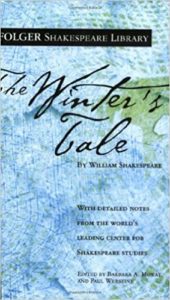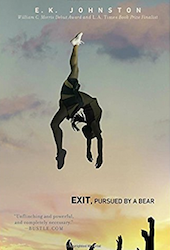I like black bears. They are relatively common around
here, and they are usually not aggressive. Actually,
they are generally affable, loners mostly, but not
opposed to hanging out with humans now and then.
In fact, I’ve found that in many ways they are a lot
like us.”
William Shakespeare would agree with Louise Jenkins’ description of bears. Perhaps that’s why he wrote the most famous stage direction of all time in act 3, scene 3 of The Winter’s Tale: “Exit, pursued by a bear.”

Similarly, in E.K. Johnston’s YA novel Exit, Pursued By a Bear, we don’t see the unidentified teenage male pursue Hermione Winters, exit with her into the woods, and rape her. We get the news secondhand, not from a Clown but from Hermione’s best friend, Polly. And if something terrible is going to happen, you want a friend like Polly.
“Whatever the odds, if Polly is cheering for you, you are a force to be reckoned with.”
Polly is, essentially, Paulina from The Winter’s Tale. She is the friend and defender of Hermione, who is the innocent, the blameless. How good? Let’s say it three times.
“Good queen, my lord, good queen: I say good queen.”
When Johnston first read The Winter’s Tale, she saw it as a story about the friendship between Hermione and Paulina, and she wanted to explore that in a modern context. There are other echoes 
In The Winter’s Tale, King Leontes suspects his wife of having an affair with his boyhood friend, King Polixenes of Bohemia. He refuses to listen to the Oracle, who declares, “Hermione is chaste; Polixenes blameless.” Hermione is sent to prison, where she bears a child who is whisked away. Her other son dies, and, according to Paulina, so does Hermione.
“the queen, the queen
The sweetest, dearest creature’s dead”
While some readers believe Hermione does die and is brought back to life at the end of the play, others believe Paulina hid Hermione for sixteen years and took care of her. Despite my love of all things magical, in this case I prefer the practical interpretation because it emphasizes the friendship of the two women.
Shakespeare leaves the question open. Did the sculptor create a life-size version of Hermione that appears to be aged exactly sixteen years? Or is that the real, live Hermione? Writing about the play at Tor.com, Alex Bledsoe says this problem is similar to the mystery of the math concept pi: “We know it’s there, we know it works, but we can never quite get to the end of it so we can comprehend it all.”
In Exit, Pursued by a Bear, Hermione Winters definitely does not die. She has to go back home after cheerleading camp, back to her senior year of high school. She has to deal with medical professionals, police officers, and a psychiatrist. She has great parents and a great coach. But mostly, she has Polly.
Who is this Polly/Paulina? What kind of friend is she? Just picture actor Judi Dench, who played Paulina in a 2015 film production of The Winter’s Tale. If you were falsely accused, wouldn’t you want Dame Judi as your cheerleader?
Johnston, who wrote mostly fantasy fiction before Exit, calls the book “my fantasy novel. To write it, I imagined a world where a girl is believed and supported; a world where adults do their jobs and children are gracious; a world where a bear of a girl can heal, and then save herself.”
But Hermione is not the only bear in this story. Neither is the bear who attacks her. The real bear is her best friend, Polly.
“She looks completely harmless, except when her teeth are bared. In her heart, she’s always been a bear.”
We need bear-like friends, generally affable, except when they bare their teeth. We need them holding our hands, helping us breathe, even hiding us, if necessary, when everything good in our lives is stripped away through no fault of our own.
At the end of The Winter’s Tale, Hermione says “Good Paulina, Lead us from hence.” In Exit, Hermione Winters says, “I will not be a frozen example, a statued monument to there-but-by-the-grace-of God. I have danced before and I will dance tomorrow.” And she exits the field with her fellow cheerleader and bear-like friend.
Photo by barbara w, Creative Commons, via Flickr. Post by Megan Willome, author of The Joy of Poetry.
Browse more Great Friendship Tales
“Megan Willome’s The Joy of Poetry is not a long book, but it took me longer to read than I expected, because I kept stopping to savor poems and passages, to make note of books mentioned, and to compare Willome’s journey into poetry to my own. The book is many things. An unpretentious, funny, and poignant memoir. A defense of poetry, a response to literature that has touched her life, and a manual on how to write poetry. It’s also the story of a daughter who loses her mother to cancer. The author links these things into a narrative much like that of a novel. I loved this book. As soon as I finished, I began reading it again.”
—David Lee Garrison, author of Playing Bach in the D. C. Metro
- Perspective: The Two, The Only: Calvin and Hobbes - December 16, 2022
- Children’s Book Club: A Very Haunted Christmas - December 9, 2022
- By Heart: ‘The night is darkening round me’ by Emily Brontë - December 2, 2022


L.L. Barkat says
This story sounds chilling. Did you like it?
(And, I’m trying to figure if I’m a sometimes-bear. 😉 )
Megan Willome says
Yes, you are.
I loved the story, and chilling is not at all the word I would use. The vibe is more of a training montage, with Hermione pushing on and moving forward and generally being amazing, even as she says, “I want to be amazing for something else.”
L.L. Barkat says
Fascinating to me—which goes to your comment yesterday on the Memories post, about being a story teller. I mean, I know that these are fictional characters, but taking our cue from them… how we frame the things that have happened to us and how we frame our responses to those things, at the level of language and story, set the stage for how we move on (or don’t move on) from the memories and what the memories themselves even become. I like the idea of the training montage. Taking that with me. 🙂
Megan Willome says
Essentially, that’s what this book is about–how Hermione chooses to tell her story. That’s why I love it so much and why I gave it to my daughter. Incidentally, the enthusiastic recommendation came from Margaret H. Willison, who I quoted in the first Laura Ingalls Wilder post.
L.L. Barkat says
Thinking, thinking. Implications for “By Heart, on the “a story in every soul” side. 🙂